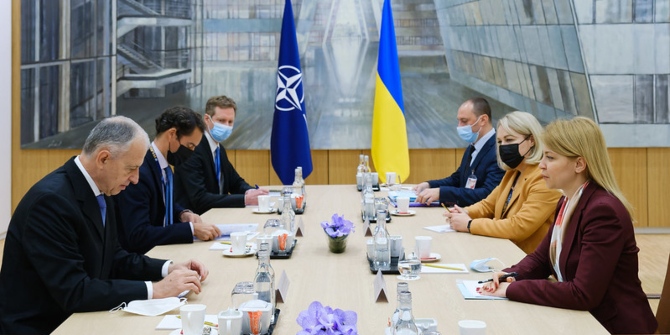 During his time as president, Donald Trump had an often-difficult relationship with the US intelligence community, frequently accusing its agencies of undermining him. Ronan P. Mainprize writes that if Trump regains the White House following the 2024 presidential election, then we should expect renewed conflict between Trump and his intelligence agencies. Yet, while Trump’s challenges are serious, he was not the first president to criticise or politicise intelligence agencies. Properly prepared these agencies should be able to continue to be effective despite Trump’s attacks.
During his time as president, Donald Trump had an often-difficult relationship with the US intelligence community, frequently accusing its agencies of undermining him. Ronan P. Mainprize writes that if Trump regains the White House following the 2024 presidential election, then we should expect renewed conflict between Trump and his intelligence agencies. Yet, while Trump’s challenges are serious, he was not the first president to criticise or politicise intelligence agencies. Properly prepared these agencies should be able to continue to be effective despite Trump’s attacks.
‘Intelligence agencies should never have allowed this fake news to “leak” into the public,’ then president-elect Donald Trump tweeted in 2017. ‘One last shot at me. Are we living in Nazi Germany?’ Never one for subtlety, it was not difficult to understand what he was alluding to. As President, Trump had a notoriously turbulent relationship with the United States (US) intelligence community which frequently spilled over into public skirmishes. And with his return to the Oval Office in 2025 a distinct likelihood, concern is beginning to grow over the damage he could once again inflict upon America’s intelligence agencies.
Trump and the intelligence community
Much of this anxiety is reasonable. Trump poses significant challenges to the intelligence community at a critical time for US national security. Yet it is essential to acknowledge that such challenges are far from unique. Trump is certainly an extreme case who should provoke unease, but American intelligence has received tough barrages from Presidents in the past and continued to be highly effective. Should Trump return, it will likely do so again.
Trump’s attitude to the US intelligence community could hardly be in more contrast to that of the incumbent president, Joe Biden. Drawing on his extensive government experience in the legislative and executive branches, Biden has enjoyed a relatively harmonious relationship with intelligence since his inauguration in January 2021. Scholars have noted that he holds the community in high regard, finds value in the products they offer, and understands how they should be utilised in the context of foreign policy. The Biden administration’s enhanced fusion of intelligence and diplomacy, spearheaded by Central Intelligence Agency (CIA) Director William Burns, has brought positive results, most notably in the lead up to Russia’s full-scale invasion of Ukraine.
This harmony will no doubt have been appreciated after the tumultuous years of Trump, whose tenure brought an array of presidential attacks on the intelligence community, harming both their reputation and abilities. Aside from rarely reading his President’s Daily Brief, Trump branded the CIA as just another component of the ‘deep state’, labelling intelligence officers as ‘disgraceful’ ‘sick people’ who do little more than spread fake news in attempts to undermine his administration. Numerous former Agency Directors – including John Brennan, Michael Hayden, and Michael Morell – were among a host of officials who offered their own criticism in return. The nadir perhaps arrived in July 2018 in Helsinki, where Trump sided with Vladimir Putin over his own intelligence agencies during a press conference.
Such tension should hardly have come as a surprise. Presidents and the intelligence community have clashed before when the commander-in-chief has failed to understand the community’s mission or it’s organisational culture. Speaking truth to power, upholding the objectivity of their analysis, and maintaining a certain distance from the White House’s policymaking process are strongly embedded ideals amongst intelligence officers. With their demands for unquestioning loyalty and policy prescription, many administrations have failed to appreciate this.

“President Trump Holds a Meeting in the O” (Public Domain) by The Trump White House Archived
Trump’s potential plans for US intelligence agencies and how to weather them
A Trump return in 2025 would mean a resumption, and likely an intensification, of his conflict with intelligence agencies. Recent reports have detailed his future plans, with the weaponisation of the intelligence community being achieved via a comprehensive politicisation of its operations and the appointment of allies into senior roles. Former officials have warned that inexperienced loyalists could soon be in top positions, only feeding briefs back to the White House that conform to Trump’s own views on foreign policy and national security. These warnings should definitely ring alarm bells, but it is still important to realise that the challenges Trump poses are far from unprecedented.
The war of words between Trump and former intelligence officials played out in particularly public fashion, thanks in part to the President’s prolific usage of social media. But barbs aimed at intelligence agencies from the White House are not exclusive to Trump. Nor are partisan appointees to senior intelligence roles anything new. Numerous presidents – Lyndon Johnson, Gerald Ford, and Bill Clinton among them – have sought to place often unqualified political allies within the intelligence ranks, leading to damaging consequences. Richard Nixon’s selection of James Schlesinger for Director of Central Intelligence in 1973 was perhaps the most controversial. Schlesinger was quickly shunned by the CIA’s staff and left after only five months in charge, but not before he fired a substantial portion of the Agency’s personnel.
When it comes to the politicisation of the intelligence cycle, there is again a much longer history. Strain between policy circles and intelligence communities is arguably inherent to the relationship within democratic systems, and is not just limited to the US. Presidents have often exerted pressure on their intelligence agencies to supply products that add support to their preformulated policies. Flashpoints have included disagreements over strategy during the Vietnam War, as well as the Bush administration’s politicisation of intelligence in the lead up to the 2003 invasion of Iraq.
Such difficulties may have damaged the reputation and efficacy of the US intelligence community for short periods, but it has always had the ability to weather a presidential storm and continue to uphold national security. This history does not dampen the seriousness of the challenges Trump poses, yet it can still be instructive. A Trump-proofing plan – one that builds on the improved reputation US intelligence has garnered through Biden’s usage of strategic public disclosures – needs to be created and implemented by the intelligence community. Maintaining the distance to the White House, keeping clear of Beltway politics, and protecting the intelligence process from manipulation wherever possible will ensure that the community will live to fight another day.
- Please read our comments policy before commenting.
- Note: This article gives the views of the author, and not the position of USAPP – American Politics and Policy, nor the London School of Economics.
- Shortened URL for this post: https://wp.me/p3I2YF-dTM






